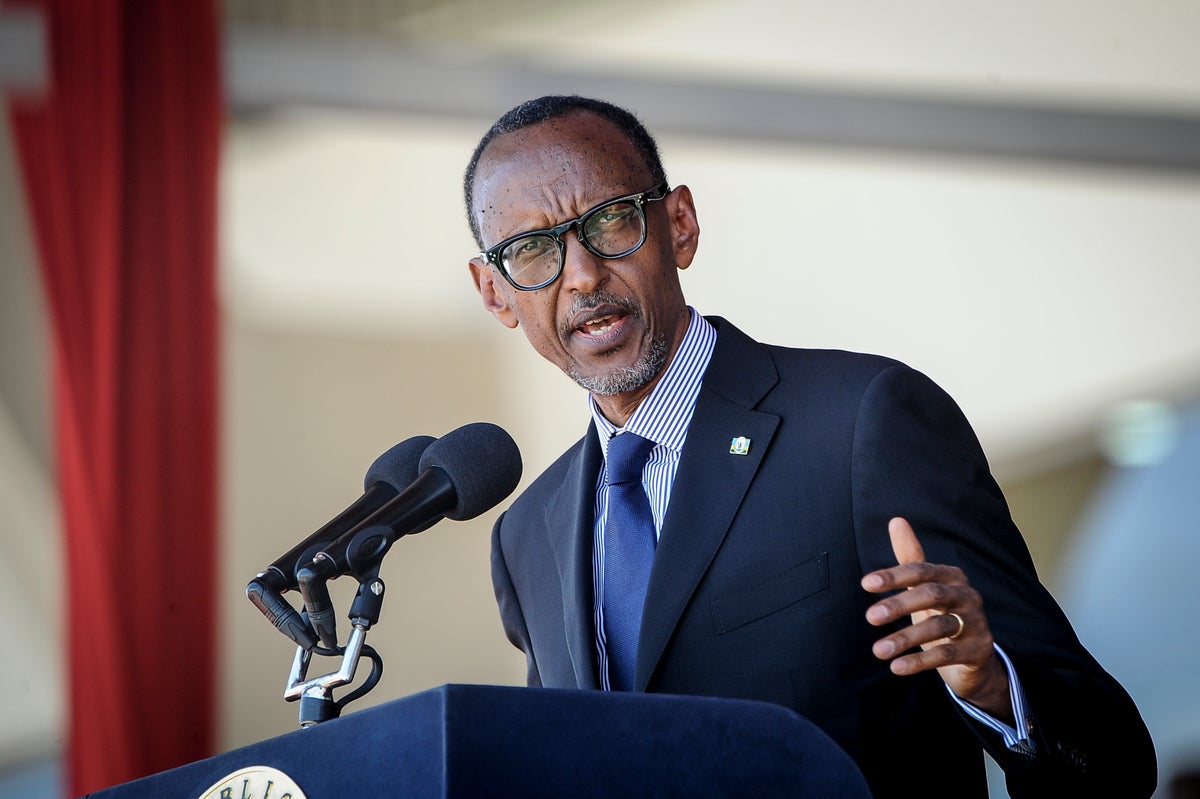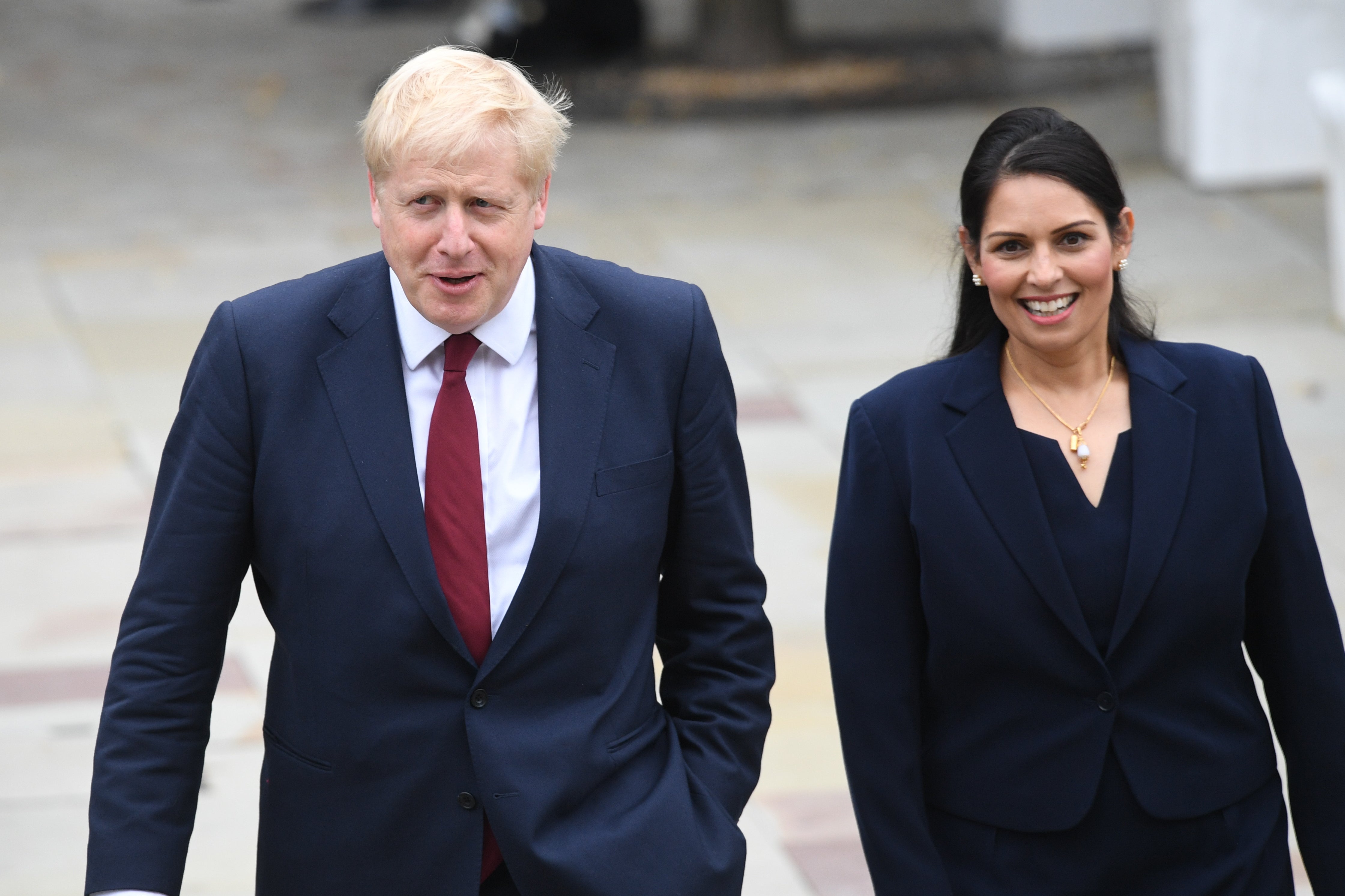
The British government unveiled a £1.4bn plan in April to send asylum seekers to Rwanda while their applications are processed by the Home Office, a move that has been described as “appalling” by Prince Charles, “cruel and nasty” by the Refugee Council, “unworkable, unethical and extortionate” by shadow home secretary Yvette Cooper and even “evil” by Ian Blackford of the Scottish National Party.
But home secretary Priti Patel’s contentious endeavour looks set to go ahead anyway despite the outcry, after a High Court judge rejected campaigners’ bid to secure an injunction to stop the first deportation plane leaving for Africa on the basis that it was unlawful.
Unless an appeal being heard on Monday overturns that ruling, the first flight to Rwanda will take off on Tuesday, albeit with just 11 people on board, not 31 as initially reported, according to campaign group Care4Calais, after 20 tickets were cancelled.
Meanwhile, crowds chanting “we are with you” and “refugees are welcome” demonstrated outside the Brook House Immigration Removal Centre near Crawley on Sunday in solidarity with those being detained.
For his part, prime minister Boris Johnson has defended the strategy, telling LBC it is intended to break up criminal gangs who engage in people-trafficking activities.
“I think that it’s the job of government to stop people breaking the law and to support people who are doing the right thing; that’s what we are doing,” he said.
The “offshoring” arrangement with Rwanda, a country 4,300 miles away, will earn the African nation £120m under the initial deal, although its record on human rights has already been raised as a major cause for concern by protesters.
Rwanda signed a similar agreement with Israel between 2014 and 2017 that was not a success, with almost all of the 4,000 detainees sent there swiftly leaving the country to undertake the perilous journey to Europe, some of whom are understood to have fallen prey to traffickers en route, notably in Libya.
Denmark also agreed an equivalent deal with the country last year and was rebuked by the African Union for “burden shifting”.
Simon Hart MP, secretary of state for Wales, defended the policy when it was first announced on Sky News, where he was asked by presenter Kay Burley about the fact that Rwanda’s president, Paul Kagame, had been accused of human rights abuses “on more than one occasion”.
“That is true…”, he said. “But that doesn’t alter the fact that their reputation, as far as migrants are concerned – and their economic progress – is phenomenal, so I don’t think we want to write this off now.”
Mr Kagame has been president of Rwanda since April 2000 and has regularly been accused of engaging in the political oppression of his opponents.
He rose to power in the aftermath of the Rwandan civil war of 1990-94 between the Hutu and Tutsi people, when he served as commander of the Tutsi-led Rwandan Patriotic Front, which defeated the national army and Hutu militias before eventually establishing its own government.
That conflict was deeply bloody and saw Hutu extremists commit genocide, engaging in atrocities in which anywhere between 500,000 and a million Tutsis were murdered over the course of 100 days, which in turn led to Jean Paul Akayesu, Hutu mayor of Tabathe, becoming the first person in history to be convicted of the crime under the UN Genocide Convention at International Criminal Tribunal for Rwanda on 2 September 1998. A further 29 people were convicted of the same offence in a landmark ruling.
But one does not have to look back that far to find evidence of the UK government’s own anxieties about Rwanda and Mr Kagame’s authoritarian rule.
On 25 January 2021, Julian Braithewaite, director general for Europe at the Foreign, Commonwealth and Development Office, told the UN Human Rights Council in Geneva, Switzerland: “We remain concerned... by continued restrictions to civil and political rights and media freedom. As a member of the commonwealth, and future chair-in-office, we urge Rwanda to model commonwealth values of democracy, rule of law, and respect for human rights.”
He recommended that Rwanda conduct credible investigations into “allegations of extrajudicial killings, deaths in custody, enforced disappearances and torture”, protect the freedom of the press and “screen, identify and provide support to trafficking victims, including those held in government transit centres”.
The UK’s international ambassador for human rights, Rita French, appeared before the same body on 8 July 2021 and expressed regret that the country had so far ignored Mr Braithwaite’s first and third suggestions.

The US State Department also listed extensive concerns about Rwanda’s human rights practices in its most recent assessment of the country.
It warns: “Significant human rights issues included credible reports of: unlawful or arbitrary killings by the government; forced disappearance by the government; torture or cruel, inhuman, or degrading treatment or punishment by the government; harsh and life-threatening prison conditions; arbitrary detention; political prisoners or detainees; politically motivated reprisals against individuals located outside the country, including killings, kidnappings, and violence; arbitrary or unlawful interference with privacy; serious restrictions on free expression and media, including threats of violence against journalists, unjustified arrests or prosecutions of journalists, and censorship; serious restrictions on internet freedom; substantial interference with the rights of peaceful assembly and freedom of association, including overly restrictive laws on the organisation, funding, or operation of nongovernmental and civil society organisations; serious and unreasonable restrictions on political participation; and serious government restrictions on or harassment of domestic and international human rights organisations.”
International NGO Human Rights Watch (HRW) likewise states: “The ruling Rwandan Patriotic Front continues to target those perceived as a threat to the government. Several high-profile critics have been arrested or threatened and authorities regularly fail to conduct credible investigations into cases of enforced disappearances and suspicious deaths of government opponents.
“Arbitrary detention, ill-treatment, and torture in official and unofficial detention facilities is commonplace, and fair trial standards are routinely flouted in many sensitive political cases, in which security-related charges are often used to prosecute prominent government critics. Arbitrary detention and mistreatment of street children, sex workers and petty vendors occurs widely.”
As for specific minorities, the gay rights group Rainbow Migration warns that Rwanda has no legislation in place to protect LGBT+ people and says the British government’s new agreement “means that LGBTQI+ people who have fled life-threatening situations in their home countries, and sought safety and protection from the UK, will instead be sent to a country where it is not safe for LGBTQI+ people to be open about the sexual orientation or gender identity.
“The situation for LGBTQI+ people in Rwanda is so poor that it is a source country for people seeking asylum in the UK based on their sexual orientation, albeit in low numbers.”
Rainbow Migration points to an HRW report from last year that alleged: “Rwandan authorities rounded up and arbitrarily detained over a dozen gay and transgender people, sex workers, street children, and others in the months before a planned June 2021 high-profile international conference.
“People interviewed who identified as gay or transgender said that security officials accused them of ‘not representing Rwandan values’. They said that other detainees beat them because of their clothes and identity. Three other detainees, who were held in the ‘delinquents’ room at Gikondo, confirmed that fellow detainees and guards more frequently and violently beat people they knew were gay or transgender than others.”







